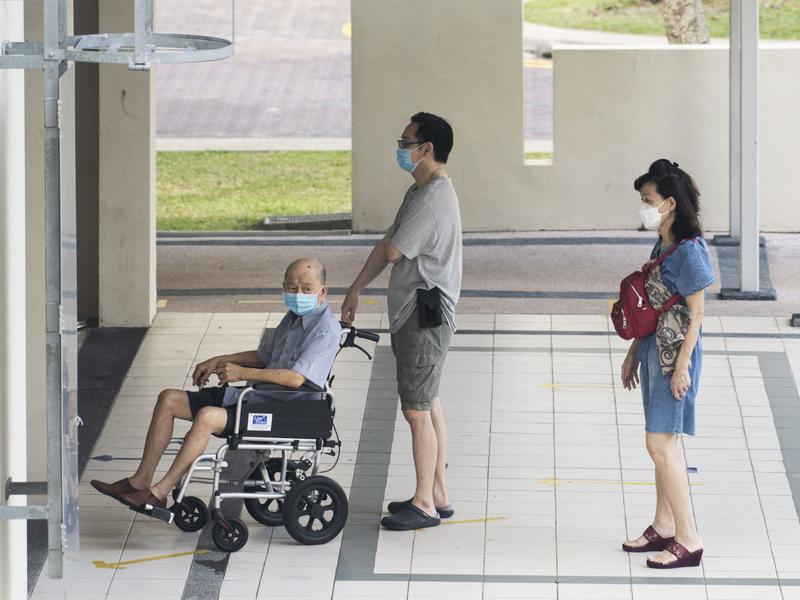 An elderly resident waits to receive his COVID-19 vaccine at a vaccination site in Singapore, on Saturday, September 25, 2021. (BLOOMBERG)
An elderly resident waits to receive his COVID-19 vaccine at a vaccination site in Singapore, on Saturday, September 25, 2021. (BLOOMBERG)
SYDNEY / JERUSALEM / DHAKA / KUALA LUMPUR / SEOUL / SINGAPORE / BANGKOK - Singapore will keep tight virus restrictions for about another month as authorities warned a record wave of infections threatens to overwhelm its health-care system.
The measures limiting outdoor social gatherings to two people and making work from home the default will continue until Nov 21, the health ministry said in a statement on Wednesday. The government will extend aid amounting to S$640 million ($476 million) to help businesses and people, it said.
The measures limiting outdoor social gatherings to two people and making work from home the default will continue until Nov 21, the health ministry said in a statement on Wednesday
“We are trying to add capacity, but it’s not simply a matter of having extra beds or purchasing new equipment, because our medical personnel are stretched and fatigued,” said Finance Minister Lawrence Wong, who also co-chairs a government taskforce to deal with the virus. “We face considerable risk of the health-care system being overwhelmed.”
New infections rose to a record 3,994 on Tuesday. More than two-thirds of intensive care beds are already occupied by both COVID-19 and non-COVID-19 patients, and 89 percent of 1,650 available isolation beds at public hospitals have been filled, according to authorities.
The surge in infections has thwarted the government’s resolve to ease domestic restrictions, even with 84 percent of the population fully vaccinated and 98.6 percent of COVID-19 patients experiencing only mild or no symptoms. The restrictions implemented last month were originally slated to be in place until Oct 24.
Wong said authorities will continually review the situation to see if there is any scope for easing in the coming weeks.
According to the government, there are currently 200 ICU beds for COVID-19 patients in public hospitals, with an extra 100 that can be set up at short notice.
Extended support measures of S$640 million will be funded from previously collected revenue, with no draw on past reserves, the government said.
It added that half-month rental support will be extended to government-managed food centers and store tenants via rental waivers and cash payouts.
Funding support will also be extended for taxi and private hire car drivers till December, the government said.
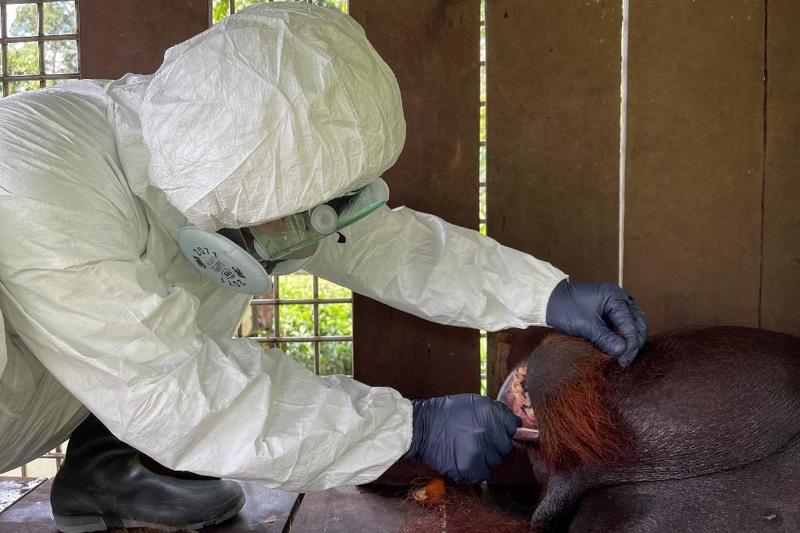 This undated handout photo from the Sabah Wildlife Department released on Sept 12, 2021 shows a vet wearing personal protective equipment while collecting a swab sample from an orangutan for COVID-19 coronavirus testing at the Sepilok Orangutan Rehabilitation Centre in Sandakan on the Malaysian island of Borneo.
(HANDOUT / MALAYSIA'S SABAH WILDLIFE DEPARTMENT / AFP)
This undated handout photo from the Sabah Wildlife Department released on Sept 12, 2021 shows a vet wearing personal protective equipment while collecting a swab sample from an orangutan for COVID-19 coronavirus testing at the Sepilok Orangutan Rehabilitation Centre in Sandakan on the Malaysian island of Borneo.
(HANDOUT / MALAYSIA'S SABAH WILDLIFE DEPARTMENT / AFP)
Malaysia
Malaysia’s COVID-19 tracking application has been misused by “malicious scripts” to send unsolicited one-time passwords to random phone numbers.
The team running the MySejahtera app, which also verifies COVID-19 vaccinations, said they received complaints from several users about getting OTP messages to verify their phone numbers for check-in QR registrations.
Some users, including lawmaker Fahmi Fadzil, received emails saying they’ve tested positive for COVID-19.
Based on an initial investigation by the National Cyber Security Agency, the fake emails are due to the abuse of API, and not because of a leak in the app’s database, the health ministry said in a statement on Wednesday.
The incident sparked concerns on social media about a likely leak of personal data involving the nation’s 32 million people. The MySejahtera team assured users that their data was not accessed by the “malicious scripts” and that the issue will be fixed soon.
About 94 percent of the nation’s adults have completed their COVID-19 vaccination as of Tuesday, while 97 percent of the adult population had received at least one dose, according to the health ministry. The rapid vaccine rollout has allowed the government to lift curbs on movements as it aims to reopen all economic and social sectors by the final quarter of the year.
Malaysia reported 5,516 new COVID-19 cases on Wednesday, with the tally staying below the 6,000 mark for a third day. New daily infections have remained below the 10,000 mark since Oct 3.
South Korea
South Korea reported 3,383 more cases of COVID-19 variants for the past week, bringing the total number of such cases to 43,054, the health authorities said Wednesday.
Among the new cases found for one week till Oct 16, 138 were imported from overseas while the remaining 3,245 were locally transmitted, according to the Korea Disease Control and Prevention Agency.
The far higher number of local transmissions indicated the domestic spread of the variants.
Of the new cases, 3,380 came from the Delta variant, one from Alpha, one from Beta and one from Gamma.
Among the combined cases involving the variants, 39,583 stemmed from the Delta variant, 3,293 from Alpha, 151 from Beta and 27 from Gamma. The four variants are believed to be more transmissible than the original one.
Meanwhile, the country confirmed 16,972 "breakthrough" COVID-19 infections, which refer to people who tested positive after a full vaccination, as of Oct 10. It was up 3,112 from a week earlier.
It equals to 73.2 in every 100,000 people who got fully vaccinated. As of Oct 10, the number of the fully inoculated people was 23,174,126.
It is known that people can be protected from the virus two weeks after full vaccination. The breakthrough case refers to people infected with the virus two weeks after full inoculation.
In the latest tally, South Korea reported 1,571 more cases of COVID-19 for the past 24 hours, lifting the total number of infections to 346,088. The daily caseload has hovered above 1,000 for 106 days since July 7.
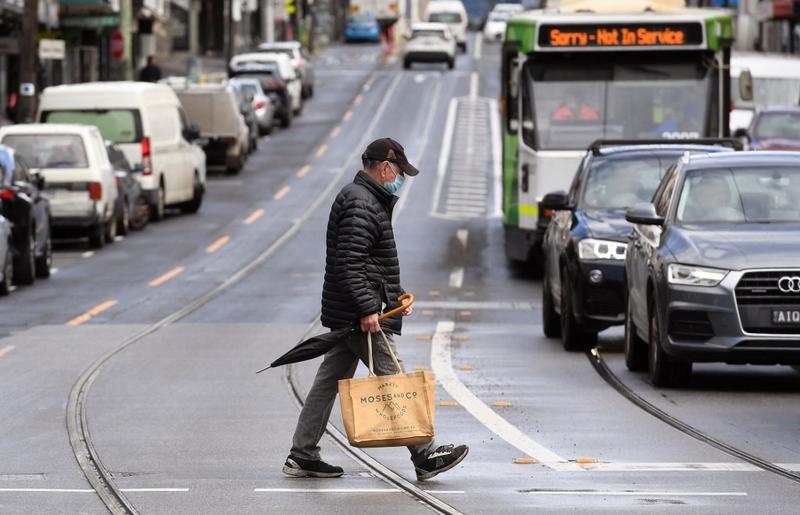 A man crosses a street in Melbourne on Oct 11, 2021, during a lockdown against COVID-19 coronavirus as Sydney ended a 106-day lockdown. (WILLIAM WEST / AFP)
A man crosses a street in Melbourne on Oct 11, 2021, during a lockdown against COVID-19 coronavirus as Sydney ended a 106-day lockdown. (WILLIAM WEST / AFP)
Australia
Travel restrictions between Sydney and Melbourne, Australia's largest cities, eased on Wednesday as Victoria opened its borders to fully vaccinated residents from New South Wales amid a rapid rise in immunization levels.
With cases trending lower in New South Wales, including Sydney, residents will be allowed quarantine-free entry into Victoria for the first time in more than three months. Travelers from Melbourne who wish to enter Sydney, however, must undergo a two-week home quarantine.
Daily infections in Victoria rose to 1,841 on Wednesday, up from 1,749 a day earlier. A total of 283 cases were reported in New South Wales, well down from the pandemic high in September.
The relaxation in border rules comes ahead of Victoria lifting the lockdown in Melbourne, the state capital, on Friday as double-dose vaccination rates in people above 16 neared 70 percent. More restrictions will be eased when rates pass 80 percent and 90 percent.
By Friday, Melbourne's 5 million residents would have endured six lockdowns totaling a cumulative 262 days since March 2020. Australian media say this is the longest in the world, exceeding a 234-day lockdown in Buenos Aires.
Australia had enjoyed a COVID-free life most of this year until a Delta outbreak began in Sydney in June, which quickly spread to neighboring Victoria. Other states are COVID-free or have very few cases.
Sydney and Canberra exited their months-long strict stay-home restrictions last week after racing through their vaccination targets.
Even with the Delta outbreaks, Australia's COVID-19 numbers are far lower than many developed nations, with about 149,000 cases and 1,577 deaths.
ALSO READ: Singapore reports highest single-day rise in COVID-19 cases
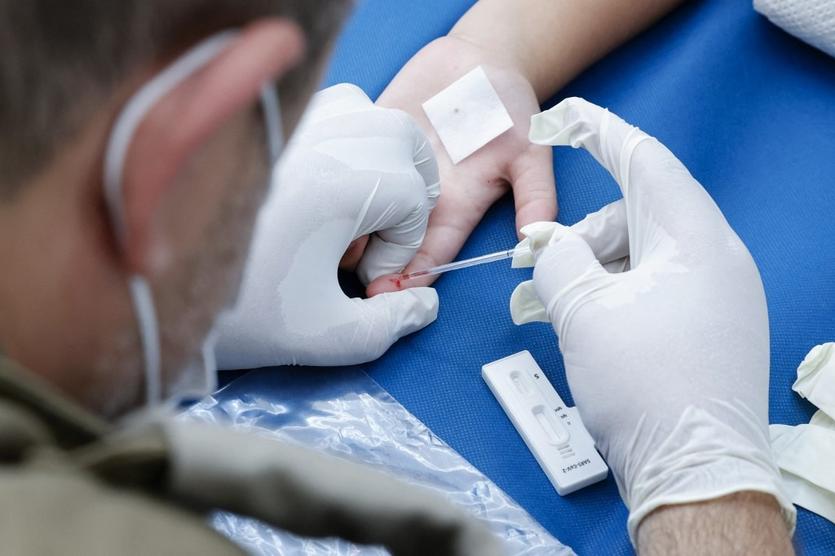 In this file photo taken on Aug 22, 2021, an Israeli child undergoes COVID-19 antibody testing in the coastal city of Netanya, before the start of the new school year. (JACK GUEZ / AFP)
In this file photo taken on Aug 22, 2021, an Israeli child undergoes COVID-19 antibody testing in the coastal city of Netanya, before the start of the new school year. (JACK GUEZ / AFP)
ALSO READ: Indonesia sees COVID-19 becoming endemic by January
Israel
The first case of the new COVID-19 Delta variant "AY4.2" was detected in Israel on Tuesday, the country's Ministry of Health said.
This is the variant that was previously detected in several European countries, the ministry noted.
It was diagnosed in an 11-year-old boy, who underwent a coronavirus test at Ben Gurion International Airport outside Tel Aviv, upon his return from Moldova.
The ministry added that the epidemiological investigation is being conducted, and all types of COVID-19 variants and their development are being constantly monitored in the country.
Also on Tuesday, the ministry reported 1,487 new COVID-19 cases, bringing the total tally of infections in the country to 1,319,001.
The death toll from the coronavirus in Israel rose by 11 to 8,021, while the number of patients in serious condition decreased from 357 to 353.
The total recoveries from the virus climbed to 1,293,854 after 1,750 newly recovered cases were recorded, while active cases decreased to 17,126.
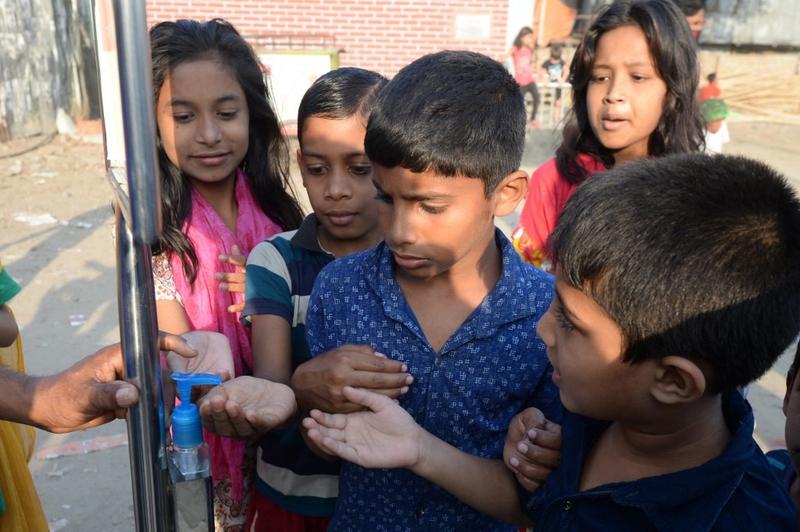 In this file photo taken on March 19, 2020, Bangladeshi children use hand sanitizer as a preventive measure against the spread of the COVID-19 coronavirus, in a slum in Dhaka. (MUNIR UZ ZAMAN / AFP)
In this file photo taken on March 19, 2020, Bangladeshi children use hand sanitizer as a preventive measure against the spread of the COVID-19 coronavirus, in a slum in Dhaka. (MUNIR UZ ZAMAN / AFP)
Bangladeshi
The education of 37 million children in Bangladesh and about 800 million children in Asia, including South Asia, Southeast Asia and East Asia, has been disrupted due to school closures since the onset of the COVID-19 pandemic in early 2020, according to a report released Tuesday by UNICEF and UNESCO.
The "Situation Analysis on the Effects and Responses to COVID-19 on the Education Sector in Asia" report highlights the continued impact of the pandemic on children's education and features various regional governments' programs and initiatives to respond to it.
In some countries, schools have been closed throughout the entire pandemic to date. In Bangladesh, schools have been shut down since March 2020 until Sept 12 this year when they reopened again.
Even now, as the world enters the last quarter of 2021, many children are facing an unprecedented second year of school closures as new variants of the coronavirus spread across the region. The associated consequences of such continuous school closures are staggering.
While countries across Asia are taking actions to provide students with distance learning, a UNICEF-supported study by the Campaign for Popular Education showed that two out of three pre-primary to upper secondary students in Bangladesh were not reached through remote education during pandemic school closures.
In addition to the lack of material assets and support to access technology, other significant obstacles that prevent disadvantaged children, and many girls, from accessing distance learning during these difficult times include a generally poor learning environment, an increase in pressure to take up domestic household chores and being forced to work outside the home.
The report underscores the importance of delivering equitable and inclusive distance learning at scale to reach all children during full or partial school closures, while providing a package of support to ensure children's health, nutrition and wellbeing.
The increased risk of dropping out of schools due to the pandemic, especially for girls and children in poor and already marginalized families, threatens to reverse progress made in school enrolment in recent decades.
According to the report, education budgets in the region will need to increase by an average of 10 percent to catch up with such losses if Asia is to reach the education targets of the UN 2030 Agenda's Sustainable Development Goals in the next nine years.
Kuwait
Kuwait has lifted all COVID-19 restrictions for vaccinated people, its prime minister, Sheikh Sabah Khaled Al-Hamad Al-Sabah, told a news conference on Wednesday.
He did not give further details during the televised event.
Kuwait airport will resume operating at full capacity from Oct 24, the cabinet spokesman told the same news conference.
The Gulf country has been witnessing a gradual return to normal life as daily cases of coronavirus have steadily declined.
The latest easing includes permitting the holding of conferences, weddings and other social events, provided that attendance is limited to those who have been vaccinated.
Thailand
Thai government officials on Wednesday inspected the readiness of the country's airports to welcome quarantine-free travelers, due to return next month after almost two years of strict COVID-19 rules that halted vital tourism.
From Nov 1, the country will allow vaccinated arrivals from low risk countries to return to its popular destinations like Pattaya, Chiang Mai and Bangkok.
Tourism before the pandemic was a leading driver of the economy, accounting for 12 percent of GDP. But the tourism authority has forecast foreign arrivals will drop to just 100,000 this year, down from 40 million in 2019 before the pandemic struck.
"November 1 is the first step," Transport Minister Saksiam Chidchob said during a visit to Bangkok's Don Muang airport on Wednesday.
"Foreign tourists and investors from at least 10 countries which are in health-safe zones, as well as doing great financially, can come to visit and spend in the country."
Thailand piloted reopening earlier this year in its resort island of Phuket, allowing fully-vaccinated tourists to skip Thailand’s mandatory two-week quarantine provided they remained on the island.
But Saksiam said the wider reopening would be even simpler for travelers, as testing on arrival could be done at hotels and other accommodations rather than at the airport.
"The entire time a visitor will spend from getting through the terminal gates to leaving the airport would take no more than 25 minutes," Saksiam told reporters.


